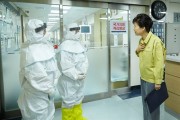Article from Yonhap: [June 3, 2015]
Dispute over ‘MERS Hospital’ Disclosure – ‘The Right to Know’ vs ‘Grave Consequences’
Anticipation for a change in government response as ruling party demands reexamination.
A debate is erupting over whether to publicly release the list of hospitals that treated patients diagnosed with Middle East Respiratory Syndrome (MERS).
Although the government is adhering to their non-disclosure stance, even members of the ruling party, along with the opposition party and groups of citizens, are demanding a release of information, creating anticipation for a change in the government’s course of action.
Since last weekend, when people began being diagnosed with MERS in rapid succession, there has been a public outcry demanding a list of hospitals where MERS patients were diagnosed or treated be made public. A list of hospitals whose status has not been verified is circulating through the internet and social media.
Despite much of the false rumors out there, it is possible to find some relatively accurate lists compiling hospitals that treated MERS patients.
Civil society organizations and the opposition party have been advocating for transparency regarding MERS treatment centers. They argue that it is the people’s right to know and [more transparency] will prevent unnecessary concern.
The National Union of Healthcare Workers repeatedly pressed for the publication of a list of regions and hospitals where MERS patients are confirmed in its June 3rd statement.
The union claimed that, “The solution to MERS is openness, not secrecy”, adding that the reason that the so-called MERS ghost story has run rampant is because the government is losing the public’s trust as it refuses to publish information.
Congressmen from the New Politics Alliance for Democracy’s Committee on Health and Welfare demanded disclosure of the medical institutions that treated patients with MERS.
Even today, the government adhered to its policy of keeping the information classified.
The government defended its line, saying that if it revealed the affected regions and hospitals, it would foster fear and chaos among other patients, health professionals, and local citizens. Hospitals would be unnecessarily branded, causing patients to avoid affected hospitals that they normally visit and thus would cause inconvenience.
If the hospitals end up facing this type of situation, managers of those hospitals on which authorities rely on to report MERS cases may become more concerned with their loss of profits. Health officials fear that this could create a gap in long-term disease response.
Kwon Joon-wook, the Head of Planning and Management for the MERS Central Response Headquarters, said on May 31 that, “Even in developed countries like the United States, there aren’t many cases where the regions or hospitals that handle an infectious disease are publicly revealed.”
Kim Woo-joo, Joint Committee Head of the MERS Public and Private Joint Response Force and Chairman of the Board for the Korean Society of Infectious Diseases, pointed out on the same day at the Sejong Government Complex media briefing that, “As the names of perfectly safe hospitals who are diligently treating MERS patients, hospitals who have already been investigated, are divulged, the consequences of that public knowledge are considerably worrisome.”
Kim expanded on his concern, saying, “If we put hospitals that are altruistically treating MERS patients on the chopping block, especially considering they were not designated to provide such a response, then the private sector may pledge to not deal with such infectious diseases in the future.”
Considering that South Korea has even fewer public hospitals than the United States, whose health care system relies heavily on private hospitals, if the private sector stops treating an infectious disease, then a proper disease response becomes essentially impossible.
However, more and more people feel that given the fairly concrete list of hospitals already in circulation, maintaining the privacy policy is in fact just fostering terror.
One private hospital in Gyeonggi province falsely rumored to be a MERS hospital has threatened to take legal action. It claims that the policy of secrecy has invited misunderstandings.
What really has the public’s attention, however, are calls for openness from the President’s own Saenuri party, which may be the tipping point.
Today at a meeting of members of the Supreme Council and other prominent Saenuri Party lawmakers, Chairman Kim Moo-Sung, Floor Leader Yoo Seung-in, and others ranging from leadership to junior representatives, took a stand and ordered the administration to reevaluate the secrecy policy.
Comments from Naver:
elee****
Obviously we should know. Is this a joke?
yljh****
Isn’t disclosure a no-brainer? Do the hospitals come before the entirety of Korea’s population? Don’t we need to know the affected hospitals so we can avoid them and prevent MERS from spreading?
tndm****
If everyone in the country catches MERS and dies, what use are these lousy hospitals. LOL Korea’s doing really fucking well.
saed****
“If a country can’t protect its people, then it’s not a country. President Roh, who couldn’t protect one of our own, has no right to be president and I can’t forgive him.” These were President Park Guen-hye’s words at the time of the kidnapping and murder of Sun Il Kim by al-Qaeda. ——— The SARS Outbreak: With a rate of infection higher than MERS, only 4 infected and zero deaths. South Korea set a record at the time for the country with the lowest number of transmissions. The president who oversaw the crisis: Roh Moo-hyun. Minister of Health and Welfare: Ryu Si-min.
sete****
No matter what, handle this type of thing by the books.
love****
But still, thanks to the government’s strict control, I didn’t see a single camel in the street today~
sodl****
If they had released that list from the beginning, so many people could have gone about their lives instead of being quarantined… What could be so dreadful and frightening that they just keep concealing it… The scariest thing out there isn’t MERS but our government’s leader…
unfr****
Can you really not figure out whether hospitals or people come first?
ysh1****
Are the ‘grave consequences’ the hospitals’ profits? Half the population dying from MERS would mean an even worse decline in profits~
sowu****
This worthless government, killing citizens to save hospitals…
inma****
It’s the second Sewol Ferry Incident… don’t lift a finger, just stand back…just as water kept leaking into the boat, MERS will keep spreading… and the result???
pose****
Gahh hospitals come before people ^_^ It’s already like this now but when war breaks out it’s gonna be such a nightmare that I’m already getting goosebumps.
viol****
Aren’t there a lot of people who got infected in hospitals?? That’s why you need to tell us the hospital’s names! These morons~ How can you not grasp common sense?
pcy2****
South Korea, where a hospital’s profits are more important than the peoples’ lives…
dmsg****
For whose sake was the Ministry of Health and Welfare created?







